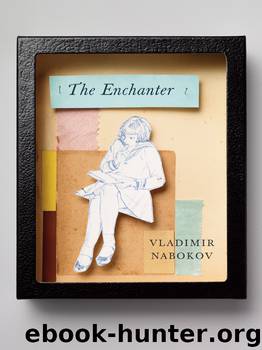The Enchanter by Vladimir Nabokov

Author:Vladimir Nabokov [Nabokov, Vladimir]
Language: eng
Format: epub, mobi
ISBN: 978-0-307-78730-9
Publisher: Knopf Doubleday Publishing Group
Published: 2011-02-15T16:00:00+00:00
On a Book Entitled
The Enchanter
by Dmitri Nabokov
THE TITLE FOR THE FOLLOWING brief notes, which may interest the reader and perhaps answer a few questions, was chosen with the half-serious thought that a small echo of Father’s postface to Lolita may amuse his shade wherever it may be.
In both translation and commentary I have tried hard to stick to the Nabokov rules: precision, artistic fidelity, no padding, no ascribing. Any conjecture beyond what I have ventured would violate those rules.
The translation itself reflects my intent to be faithful to VN in both the general and the specific, textual, senses. Many years of translating for and with Father instilled in me those categorical requirements of his. The only cases where he considered departures admissable were untranslatable expressions and revisions of the text itself, in the translated version, by the original author. It is possible that VN, were he alive, might have exercised his authorial license to change certain details of The Enchanter; I believe, though, that he would have chosen to leave intact this model of conciseness and multilevel meaning. The rare instances where I have taken the liberty of making minor adjustments occur precisely where the technique—as in the telescoped Little Red Riding Hood wordplays (this page; this page) or the high-speed imagery of the finale—would have made a totally literal rendering meaningless in English. Elsewhere, on occasion, the English may seem simply a bit unorthodox. But so, in such cases, is the Russian.
Other possible translations of the Russian word volshebnik are “magician” or “conjuror,” but I have respected Nabokov’s express intention that, in this case, it be rendered as “enchanter.” Volshebnik was written during October and November of 1939. It was signed “V. Sirin,” a pseudonym that VN used for his Russian writings from his early youth on so that they would not be confused with those of his father, who had the same given name. Sirin in Russian is both a species of owl and a bird of ancient fable, but most probably has no connection, as some have suggested, with the word siren.
The original text was dictated to and typed by Father’s first reader, Vera Nabokov. According to Nabokov’s letters, he showed it shortly thereafter to four other people, literary friends of his (see Author’s Note One).
At some point, apparently, a typescript was also shown to the émigré critic Vladimir Weidle, in Paris. It could not have been later than May 1940, when we sailed for New York. Andrew Field, who, it seems, read an article written nearly forty years after the fact by a very old Weidle not long before his death, claims1 the piece shown to Weidle differed in several respects from The Enchanter (of which Field has a very sketchy idea at best, having seen only two pages and one or perhaps both of Nabokov’s references presented at the beginning of this volume).
Presumably that version was called “The Satyr,” the girl “was no more than ten,” and the concluding scene was set not on the French Riviera but “in a remote little hotel in Switzerland.
Download
This site does not store any files on its server. We only index and link to content provided by other sites. Please contact the content providers to delete copyright contents if any and email us, we'll remove relevant links or contents immediately.
The Hating Game by Sally Thorne(19235)
The Universe of Us by Lang Leav(15068)
Sad Girls by Lang Leav(14403)
The Lover by Duras Marguerite(7893)
The Rosie Project by Graeme Simsion(6376)
Smoke & Mirrors by Michael Faudet(6183)
Big Little Lies by Liane Moriarty(5790)
The Poppy War by R. F. Kuang(5687)
The Shadow Of The Wind by Carlos Ruiz Zafón(5686)
An Echo of Things to Come by James Islington(4852)
Memories by Lang Leav(4795)
What Alice Forgot by Liane Moriarty(4623)
From Sand and Ash by Amy Harmon(4502)
The Poetry of Pablo Neruda by Pablo Neruda(4097)
The Tattooist of Auschwitz by Heather Morris(3841)
Ficciones by Jorge Luis Borges(3625)
Guild Hunters Novels 1-4 by Nalini Singh(3460)
The Rosie Effect by Graeme Simsion(3459)
THE ONE YOU CANNOT HAVE by Shenoy Preeti(3367)
